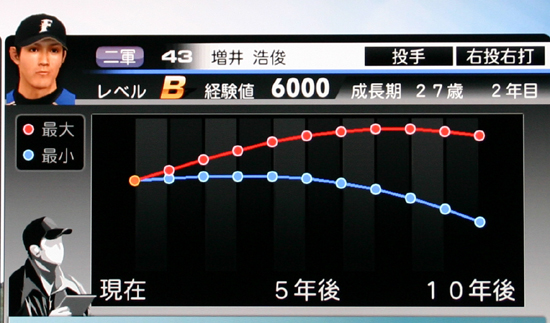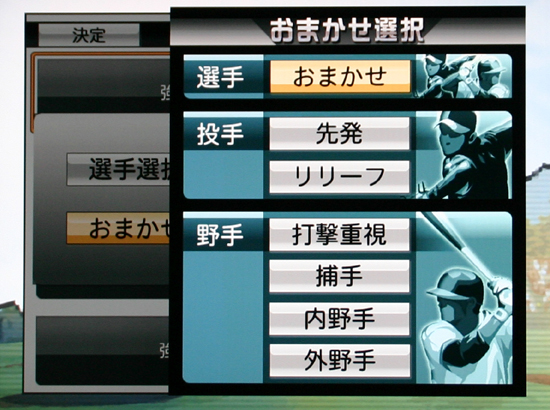PLAYER PROGRESSION
 |
PLAYER PROGRESSION:New to PYS 2011 is the 20-year Season Mode and true player progression. The picture above shows the progression possible for Fighters pitcher #43. He has 6000 experience points, he is 27 years old, and he is in his 2nd professional season. There is also a big letter “B” next to his face. Note that this “B” doesn’t represent how good he is skills-wise. The B actually stands for how close he is to fully realizing his potential. This means that he will progress to B+ and then A, which is the maximum potential. Therefore, the lower this letter is (F being the lowest), the more potential a player actually has! Now keep in mind that a guy who has achieved A/maximum potential could still be a sucky player. It just means he has reached his ceilings, however high or low it may be. Now pay attention to the graph. The starting point (orange dot) is his current level, and his potential progression paths are represented by the red and blue lines. The red line represents the best case scenario. The blue line represents the worst case scenario. As you can see, in the best case scenario (red line), this player will reach his peak ability in around year 7~8, and then he will begin to decline in year 9 and 10. In the worst case scenario (again, the blue line), he won’t even improve from his current self and he will actually start to decline badly at around year 5. Ten years later, he will be a pretty horrible player. How to reach Best/Worst case is explained below. PLAYER CATEGORIES & EXPERIENCE POINTS:Players are separated into 3 categories, mainly determined by age:
Developing Players: Age around or below mid 20’s. These players gain 2 to 4 experience points naturally after each game, whether he is in the major or minor league roster. HOW PROGRESSION WORKS:Players will progress and level up once they gather the required experience points (differs for each player). When they level up, their attributes will go up and they might earn new skills. For example, if you have a young player (who naturally gains 3 points per day for being young) and he is in your starting lineup (4 points for starting), he will gain 7 points after the game, and he can potentially gain up to 7 x 144 games in a season = 1008 points per season just from these 2 factors alone. 1008 points might be enough to make him go from a D to a D+ then to a C. He might gain 10 points in contact and 15 points in power. Now let’s go back to the graph in the picture. Best Case Scenario (the red line in the graph) can be reached if your player earns the most possible points each day. Worst Case Scenario (blue line) will happen if you completely ignore this player – you don’t train him in minor league, and you don’t use him in your major league games. Realistically, the result will be somewhere between the best and worst case scenario, leaning towards best case if you use this player a lot. TROPHY CUPS:You get extra experience points for achieving certain career objectives. These are broken down into Bronze, Silver, and Gold trophies (not to be confused with Playstation Network achievement trophies, these are just in-game fictional awards). Thus, to alleviate confusion we will instead use the term "Cup." Trophy Cups are viewable in Pennant Main Menu \ Records \ Team Achievements. Bonus Tip #1If you want to get an idea of how a young prospect’s attributes and abilities might look like if he reaches his peak, you can try going to VP Shop – Level Up/Awakening and level him up to the max. The numbers won’t be exactly the same (for example, a guy who reaches his best case scenario in season might have 95 power, but in VP Shop his fully leveled up form might have 85 power), but you will get a pretty good idea at what kind of abilities this player will have at his full potential. Bonus Tip #2To view player progression for any player outside of the training menu:
We made a video which tells you how to use these Bonus Tips. |
 |
TRAINING:Click an empty slot. It will then ask you to "Choose a Player" or "Go with Recommended." Click the top button to select a player manually to put in training. If you'd rather have the CPU recommend a player click the bottom button and it will take you to the screen shown above. If you select "recommended", the game will allow you to choose from certain roles and criteria and it will automatically choose a player with high potential: After I chose "Recommend any player" the CPU put the player shown below in training - a 19 year old pitcher with very good potential.
|
 |
| This is a post-game experience points screen. On the left side, you can see how many points each player gained or lost for the day on your entire roster. On the right side, you can see today's starter Chen. He gained a total of 18 points for the day. Below his picture are the 4 categories in which players can gain points in: Played in today's game: +16 points (starting pitchers get 16; position players get 4; relievers get 8) Developing Phase: +2 points Special Achievements: 0 points Special Training: 0 points The number 4018 is his total experience points. Below that you will see another number 982. That's how much he needs to level up and get a rating boost. |
 |
| Here you will see a declining player in the minors. He is really old so he is losing 14 points per day. Other categories are the same as the picture above, except you don't see the "Play in today's game" category because he is in the minor league. As you can see, he needs 1028 to level up, but as a player going through a rapid decline, it's impossible for him to gain enough points to offset the 14 he is losing every day. |
 |
| Finally, here we have a young prospect who we put into 1 of the 4 slots for special training. He is gaining 4 points per day since he is in the Developing Phase, and he is gaining 2 extra points from the special training for a total of 6 points per day. He is only 482 points away from leveling up. |
 |
 |
| Here is an example for Special Achievements. The player above, Morino, just recorded his 1000th career hit in this game. He is awarded a Golden Record and 200 points for this accomplishment. Let's look at his points breakdown: Played in today's game: +4 points Declining Phase: -2 points Special Achievement: +200 points Special Training: 0 points Total for the day: 202 Current Experience: 3206 Amount needed for level up: 294 |



